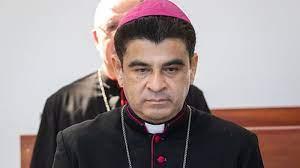Catholic Bishop Shows Power Of Faith Over Leftist Coercion
Bishop Rolando Alvarez imposed conditions for his prison release that flummoxed Sandinista totalitarians.

Recent reports indicate that a deal to free Nicaraguan Bishop Rolando Álvarez from imprisonment fell through. The deal seems to have involved the Sandinista regime, the Vatican, and Brazil’s President Lula, who is a Sandinista ally. Strangely, it was Bishop Álvarez’s imposed conditions that prevented his own release.
This is odd because people who are imprisoned, justly or unjustly, typically want to be released. That desire would be even more intense in the appalling Sandinista prisons of Daniel Ortega and Rosario Murillo. However, Álvarez has a spine that compels him to reject a deal that would legitimize the regime and defy his moral compass.
The Sandinistas were once the darlings of the world’s socialists. Their reign now stands in the global hall of shame. They are infamous for their naked corruption, their manipulation of elections to maintain their stronghold, and their ruthless violence.
Nicaragua under the Sandinistas ranks among the bottom 20 percent of countries in the World Press Freedom Index. Their main allies now are Cuba, China, Brazil, Iran, and Russia. According to the United Nations, over 100,000 Nicaraguans have fled the country since the latest political crisis began in April 2018. Since then, growing increasingly unpopular and mired in galloping paranoia, the regime initiated broader efforts to exert full control over all levels of society, curtailing the activities of all organizations that were not in their corner.
Thanks to the Sandinista government’s iron grip, Nicaragua has become a place in which the expression of dissenting political views lands citizens in prison. Hundreds have lost their lives, while thousands more face persecution, many for simply for trying to engage in public life. Several have already died while imprisoned in subhuman conditions and under torture. Many of those persecuted have been stripped of their nationality and forcibly exiled in defiance of international laws.
Among the persecuted is Bishop Rolando Álvarez, of the Matagalpa Diocese. Matagalpa is ironically the cradle of Sandinista revolutionism.
Álvarez isn’t one to stay silent in the face of overwhelming injustice. He has been a strong voice against the iron-fisted rulers, standing up for basic rights and freedoms. He’s taken a firm stance against the disturbing human-rights abuses, rampant persecution and torture, and heinous unlawful killings.
In 2019, Alvarez was falsely accused of terrorism, inciting violence, and propagating false news in retaliation. He was placed under house arrest.
In February this year, the dictators gave a bittersweet proposition to over 300 political prisoners. They could have their freedom, but there was a catch: it was a freedom away from the homeland, a stateless exile, as the price for leaving their prison cells behind.
Álvarez alone refused the offer. His defiance landed him in a swift Sandinista show trial. In a blink, they stripped him of his nationality and slapped him with a staggering 26-year prison sentence, allegedly for treason and sedition.
The bishop’s decision left the dictators scratching their heads. Sandinista power, as Mao also understood, comes from the barrel of a gun. To these tyrannical folks who clawed their way back into power using intrigue, manipulation, intimidation, and outright aggression, the bishop’s decision was an act of derangement.
Ironically, the seemingly powerless bishop demonstrated a might of his own, surpassing even that of those who oppress him. Force is not power. As philosopher Hannah Arendt argues, political power is granted through the legitimacy of consent. When leaders cling onto their office, resorting to brute force to preserve their reign, it’s a glaring sign that they lack rightful authority to govern; they lack power.
The Sandinistas have been relentlessly trying to push the bishop out of Nicaragua, not because they want him to be free but because they desperately want to portray a façade of legitimacy. Their push to have the Vatican call Álvarez to Rome, using Brazil’s president as a mediator, is only the latest such attempt.
But Álvarez remains unbowed. He spurns the carrot of freedom dangled before him because accepting it would be to accept the fabricated accusations leveled against him, the so-called charges. He will not accept any deal unless the lies are obliterated and all political prisoners, including a handful of other priests, are set free.
Most Nicaraguans oppose the treatment of the bishop. So as long as Álvarez remains on Nicaraguan soil, he is like a ticking time bomb to the dictators. His quiet defiance is a stinging rebuke to the tyrants and the tapestry of their lies. Álvarez’s presence silently challenges their plans to perpetuate themselves in office.
Thus, the botched Sandinista attempt to exile Álvarez shames the tyrants. The blunder exposes the regime, revealing that they do not hold all the reins of power, despite their political muscle and machinery of violence. It shatters their delusion of complete dominion and control over every Nicaraguan citizen. It tears through their façade of power, a setback as significant as any battlefield loss.
Despite their full control of the state apparatus, the Sandinista dictators falter when it comes to ruling the heart and soul of a simple bishop. As Human Rights Watch has already highlighted, Álvarez has single-handedly exposed the Sandinistas’ moral bankruptcy. His peaceful defiance shows what the armours of truth and courage can make possible.
Marco Navarro-Génie is president of the Haultain Research Institute. He holds a doctorate in political science from the University of Calgary, and he is the author of Augusto "César" Sandino: Messiah of Light and Truth. He writes for Impunity Observer.